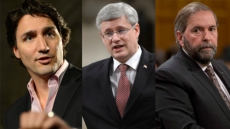OTTAWA — As the prime minister and his cabinet craft the latest anti-terror legislation, they'll be thrust into a familiar balancing act between civil liberties and public safety.
Stephen Harper will also have to contend with the friction between the strong libertarian contingent in his caucus and those who support an enhanced role for government.
There has been speculation that the bill, which Harper says will be introduced soon, will restrict speech that encourages or glorifies terrorism. Britain and France already have such controversial measures on the books.
Harper and his cabinet have strongly condemned the attack on free speech and the press that occurred when Islamic extremists targeted France's provocative Charlie Hebdo magazine last week.
Over the years, the Conservatives have introduced legislation and made political gestures that have spanned the spectrum from libertarian to interventionist.
In the category of libertarian-inspired action:
— Dismantling the long-gun registry, derided by the government as wasteful and coercive to mostly law-abiding hunters, farmers and sports shooters.
— Axing the long-form census. The government argued the mandatory nature of the questionnaire was coercive and intrusive.
— Removing the prohibition on the dissemination of phone and Internet hate speech from the Canadian Human Rights Act.
— Repealing the Elections Act ban on the publication of election results before polls have closed in certain regions.
But other measures have been much more nuanced:
— The recently passed cyberbullying bill, delayed for years amid accusations it infringed on privacy and civil liberties, gave police more online surveillance powers.
— Conservative Senate bill S-4, now in the Commons, would loosen certain privacy protections, giving some entities more power to use personal information without consent.
— A Conservative private member's bill made it illegal to wear a mask during a riot or unlawful assembly.
— The government barred British MP George Galloway from entering Canada to deliver a speech, on the grounds he was a security threat because he helped deliver aid to Gaza. Galloway later won a challenge at Federal Court and accused the Conservatives of trying to stifle debate.
— Conservatives removed two representatives from the Canadian Immigration Forum as witnesses at a committee hearing because of their views on non-white immigration.
Harper himself seemed to encapsulate the grey areas of civil liberties debates and his own pragmatic style in 2009, when he spoke to a Manning Centre networking conference.
"The libertarian says, 'Let individuals exercise full freedom and take full responsibility for their actions.' The problem with this notion is that people who act irresponsibly in the name of freedom are almost never willing to take responsibility for their actions," Harper said.
The debate around Charlie Hebdo and whether its provocative cartoons should be republished by media outlets as a statement in favour of free expression, has highlighted the range of views within the Conservative movement.
In very general terms, many of the party's libertarians hail from the West, and from the Canadian Alliance and Reform party traditions. Quebec minister Maxime Bernier is a notable exception.
In 2006, Harper ministers criticized the republication of a Danish newspaper's editorial cartoons of the prophet Muhammad. Then-defence minister Gordon O'Connor said he hoped religious groups across the country would know the government did not tolerate ridiculing any faith.
Today, some Conservatives criticize the CBC and others for refusing to show some Charlie Hebdo cartoons depicting Muhammad.
"Takes courage to publish the cartoons. Also right thing to do...," Sen. Linda Frum tweeted.
Ontario Conservative MP Peter Kent takes issue with the suggestion that individuals or media outlets are acting cowardly if they don't publish the cartoons, calling that a simplistic view.
The former TV broadcaster says there's often a vigorous debate on civil liberties within caucus and Harper is conscious of the diversity of viewpoints.
"He's certainly passionate, but I think that he recognizes that across the country, as in our party, there are shades of opinion," Kent said in an interview.
"I believe we're unanimous in defending free speech, but we just have differences of opinion on how that defence needs to or doesn't need to be demonstrated."





